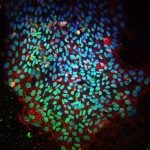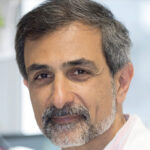Link to Pubmed [PMID] – 18950581
Med Sci (Paris) 2008 Oct;24(10):847-52
During mitosis each daughter cell inherits a full copy of the maternal genomic material. DNA replication, however, is an imprecise process, thus errors can arise resulting in potentially deleterious mutations over extended rounds of cell division and these may lead to cancinogenesis. Over thirty years ago, J. Cairns proposed that a cell could avoid the accumulation of mutations arising from DNA replication if all template DNA strands are inherited in one daughter cell during cell division, thus giving rise to the notion of DNA strands. In this model the stem cells would retain the template DNA (older) strands. Proving or disproving this notion experimentally has been challenging. Further, it has recently become apparent that epigenetic regulation of gene expression plays a critical role in governing cell states, self-renewal and differentiation. In light of these data, can the phenomenon on template DNA strand segregation also reflect this epigenetic signature? In this review we explore these notions, discuss the evidence in support of this theory, the implications, and some of the mechanisms which could explain this phenomenon.

